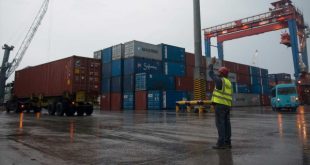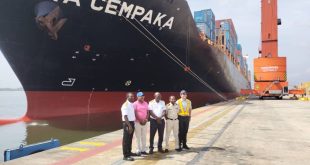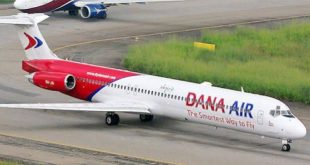
· Political interests dictate trainees, not skillset – beneficiaries
· AfCFTA: Nigeria needs to harness human resources optimally – CILT

By Kenneth Jukpor & Yusuf Odejobi
Nigeria has lavished over N25billion sponsoring maritime related training in foreign institutions around the world with little results to show for the expertise in the nation’s maritime sector and the respective agencies.
MMS Plus findings show that over 1000 Nigerians have been sponsored by leading maritime agencies such as the Nigerian Maritime Administration and Safety Agency (NIMASA), Nigerian Ports Authority (NPA), Nigerian Shippers’ Council (NSC), among others.

A NIMASA source who preferred anonymity told our correspondent that the average tuition fee collected for training ranging from 12months to 24months is around $40000 excluding accommodation and welfare also catered for by the agency for such training.

If $40,000 is spent on tuition alone, and a minimum $15,000 provided for accommodation and welfare; each beneficiary would spend $55,000 and 1000 candidates would have cost the nation in excess of N25.8billion in the last two decades.
At the World Maritime University (WMU) in Malmo, Sweden, over 600 Nigerian beneficiaries have studied at the institution which has total African alumni at about 1,110.
Revealing this to our correspondent, our source noted that WMU in a recent event organized for its alumni had charged Nigeria to gainfully deploy the resource harnessed at the institution to make significant contributions in the African maritime domain and the International Maritime Organization (IMO).
Despite these humungous sums, some beneficiaries can’t make quality contributions on basic aspects of the disciplines they were sponsored to study as their goals have mostly been the Estacode Supplementation Allowance.
In other cases, those who were studious and gained valuable knowledge have been stifled and marginalized by overbearing bosses. This category of people eventually become victims of the negative effects of memory trace theory, as they lose the skills without putting them to use.
“In Nigeria, we send people to IMO and WMU and it becomes like a jamboree. Meanwhile, other countries send one person to study and as soon as the person gets back, he is given something related to work on. For instance, if the nation sends someone to study maritime law as soon as that person returns, he or she should be given a portfolio related to the field to enable continuous utilization of the knowledge acquired,” an aggrieved NIMASA staff said.
A beneficiary of NIMASA sponsorship for training at WMU recounts an incident: “I recall a time when we had a sort of academic excursion to the IMO for a plenary session. I started looking for my Director at NIMASA after hearing some thrilling submissions but I was told he went into town. I later met him and discovered that he went shopping. He was with other senior colleagues shopping when there was an important seminar to attend.”
“These are colleagues and my seniors for that matter. It is sad that such conduct has become popular among civil servants. Why should the government sponsor individuals to learn but they choose to go on a shopping spree when they could also create time for that, if they must shop? I find it strange that the government even sponsors a worker to write an examination and the person fails. It is an embarrassment to the individual and the country. Why do we spend that amount of money to train people and the training is never utilized? Politics is what is killing Nigeria and the problem is prominent in the maritime sector, especially among the agencies,” he added.
The source argued that Liberia has taken advantage of WMU training to have commissioners that report directly to the President giving quality updates on the activities on the nation’s maritime domain, the region and the global stage.
Meanwhile, a former NIMASA staff acknowledged that so many people have been trained but at the end of the day the issues of politicking and preferential treatment play its role in posting.
Her words: “There are criteria that are required before someone is trained overseas. However, when there is a special interest in a candidate, some of the criteria are being overlooked and the influence could be as high as the presidency or a tribal leader like an Emir. You could see someone that has just been employed is trained abroad just because of sentiments.”
“Sometimes it’s up to $40,000 for tuition, it’s a whole lot because you pay as international students in dollars, and some spend up to 18 months or 24 months. We’re just talking about tuition, we’re not yet talking about accommodation. The Federal Civil Service is really spending a lot of money on all these training. The question is – are we really utilizing these training sessions?”
According to her, such topnotch training shouldn’t be a competition or for political interest.
“Some people finish training and you see them retiring, but they’re meant to sign a bond that when you come back you’re not leaving. I know some people, who because of the controversy surrounding their training had to retire. There was one particular woman that was employed because of that training alone, her father was an Emir. She went for NMA training and didn’t come back.”
“There was a training where I nominated some people when NMA transmuted into NIMASA and NMA. The training was in Ghana. Their boss saw them in Ghana and was shouting at them; but the training was sponsored by Women’s International Shipping and Trading Association (WISTA). It was a big issue then because they came for the training their boss also attended. Sometimes, even when you come back from quality training, your superiors could send you to Siberia. They could decide to put you in a department where you won’t be relevant. The next option could be to lend your voice through a professional body but in public service you may not be allowed to speak up,” she added.
Speaking with MMS Plus, the Director General of the Chartered Institute of Logistics and Transport (CILT) Nigeria, Mr. Paul Ndibe noted that the concern about wasting Nigeria’s scarce resources for training without commensurate impact in the industry is a popular one.
He, however, opined that the problem is something that a policy readjustment could correct.
“It is one thing to have these trained personnel and a different matter to have where to deploy them. The absence of a national transport policy and a vivid plan to develop the nation’s maritime industry is largely the reason we have situations like that.”
“If we have a flourishing maritime sector, we should create opportunities for human capacity because human resources in isolation will not yield the desired results. There is a place of infrastructure, policies and monetary support to achieve an environment to deploy trained professionals,” Ndibe said.
With the emergence of African Continental Free Trade Area (AfCFTA), he stressed that Nigeria needs to deploy human resources to its benefits because the nation is unlikely to reap the benefits of AfCFTA without judicious use of human resources as well as provision of necessary physical infrastructure.
According to him, another problem is that if an agency didn’t sponsor the training of an individual, it can’t dictate the best place to deploy such expertise.
“Going forward, the government should look inward to create diverse opportunities and ensure trained personnel are positioned rightly for the benefit of the nation and the sector,” Ndibe added.
 MMS PLUS NG – Maritime, Aviation, Business, Oil and Gas News Online Newspaper with coverage in Maritime, Oil and Gas, Aviation, Power and Energy as well as Financial News
MMS PLUS NG – Maritime, Aviation, Business, Oil and Gas News Online Newspaper with coverage in Maritime, Oil and Gas, Aviation, Power and Energy as well as Financial News









